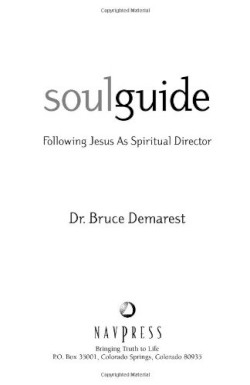Soul Guide
Following Jesus As Spiritual Director
This book uses a practical approach, utilizing clearly defined steps to lead readers from spiritual despair to a self-directed spiritual path. Even readers who already have a sense of spiritual direction will find the examples and methods of self-analysis compelling. The author, a professor at the Denver Seminary who has written ten books, graduated from Wheaton College and Trinity Evangelical Divinity School, and has a doctorate in biblical and historical theology from the University of Manchester.
Demarest uses a model of “Jesus in action” as a springboard for creating a kind of internal dialogue. Each of the twenty-five chapters begins with a description of someone going through some difficulty and ends with a section of questions called “Try it Yourself,” where readers are asked to consider the effect of the theme in their lives. At the beginning of a chapter called: “Confused: What is God Doing?” a minister is asked to leave a church because his wife and infant son have contracted AIDS from a blood transfusion. The section ends with the suggestion: “Recall a time of confusion or perplexity when you struggled to reconcile your experience in the world with what you know about the goodness of God in your head.”
Whether intentional or not, this worst-case beginning also serves to make the point that no matter how bad life gets, someone else has it worse. The idea throughout the book is to foster a sense of optimism no matter how bleak the circumstances. There is also an emphasis on questioning and evaluating one’s spiritual journey with the intention of developing a more directed approach.
Another underlying, and somewhat distracting theme, is the idea that America has fallen spiritually and somehow deserves to suffer. Citing the September 11, 2001 attacks, Demarest says that the attackers “claimed to be repulsed by the moral decadence and irreverence of prosperous America.” The author lets that statement stand as though it is some kind of proof and then goes on to quote researchers who support this thesis.
Perhaps the intention is to motivate the hesitant, but relying on the clear, insightful, and attainable method of reading, comparing, and answering questions is apt motivation. This Christian-based workbook is especially good at developing the idea that Jesus’ method of teaching, and a study of His practices, have a place in personal development.
Reviewed by
Joe Mielke
Disclosure: This article is not an endorsement, but a review. The publisher of this book provided free copies of the book to have their book reviewed by a professional reviewer. No fee was paid by the publisher for this review. Foreword Reviews only recommends books that we love. Foreword Magazine, Inc. is disclosing this in accordance with the Federal Trade Commission’s 16 CFR, Part 255.

